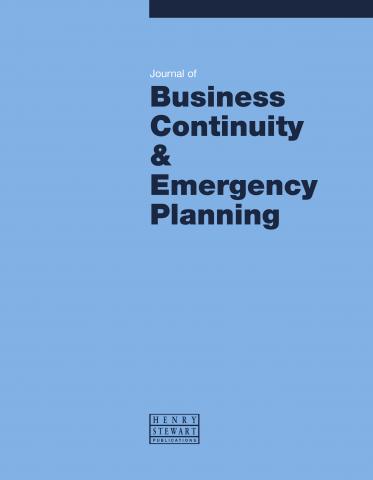"As an Editorial Board member for Corporate Real Estate Journal, I have first-hand knowledge of the rigour and standards applied to the selection and review of content ... clear evidence how the Journal is able to provide such industry leading access into the views of our profession."
Building adaptive business continuity plans: Practical tips on how to inject adaptiveness into continuity planning processes
Click the button below to download the full text of the article.
Abstract: With the world becoming increasingly complex and uncertain, the disruptions that businesses face are becoming increasingly unpredictable. Traditional approaches to business continuity planning must therefore evolve to enhance organisational resilience. As this paper will discuss, it is vital to ensure a balance between detailed planning and flexibility and adaptability. This can be achieved through: 1) creating closer links between business continuity and strategic management; 2) embedding a culture of resilience throughout the organisation; 3) decentralising business continuity planning and enabling teams and departments to design and own their own plans; 4) making planning principles- based; and 5) exercising more frequently. This paper argues that planning must be based on principles and outcomes rather than processes, and how it must, to be integrated within broader risk management and strategy functions to be inclusive of everyone, from the staff all the way up to the board. In short, preparedness and resilience must become part of their DNA.
Keywords: business continuity; organisational resilience; adaptive planning; business disruption
Tracy Hatton is a senior research fellow with Resilient Organisations, a research and consulting group focused on helping organisations, industries and economies to thrive in any disruptive environment. As a social enterprise, the group applies business principles to maximising the positive social impact of its work. It conducts robust, original research to advance the ability of organisations to foresee, proactively respond to, and effectively and efficiently recover from disruptions of all kinds. Resilient Organisations also offers services directly to organisations including organisational and employee resilience benchmarking and resilience enhancement strategy development.
Charlotte Brown has over eight years’ experience specialising in risk management, systems thinking, decision making and resilience. As a social scientist with a civil engineering background, Charlotte often works at the interface between physical and social sciences, ensuring a holistic view of resilience problems and opportunities. She is an adjunct fellow with the Department of Civil and Natural Resources Engineering at the University of Canterbury and has previously worked as an environmental and civil engineering consultant. Charlotte is a principal research consultant at Resilient Organisations.



